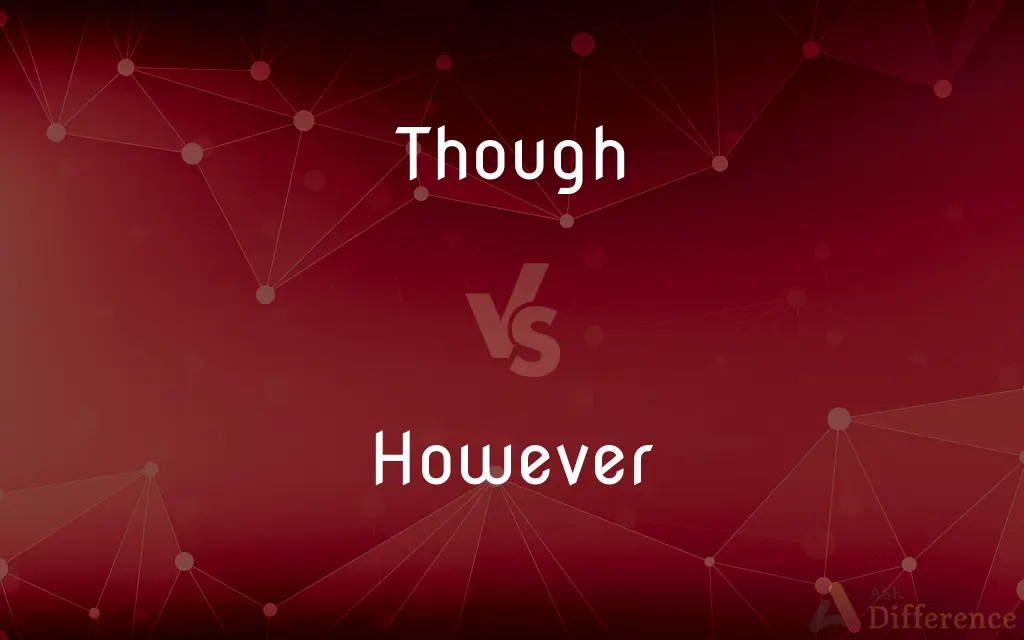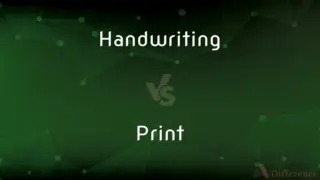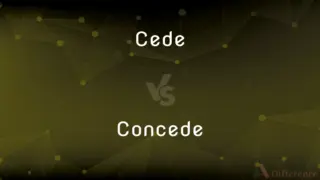Though vs. However — What's the Difference?
By Fiza Rafique & Urooj Arif — Updated on March 8, 2024
Though is used to introduce a contrast within the same sentence, while however indicates a contrast between sentences or clauses.

Difference Between Though and However
Table of Contents
ADVERTISEMENT
Key Differences
Though is a conjunction that introduces a subordinate clause, expressing a contrast with the main clause. It suggests a form of concession or surprising contrast. For example, "I went for a walk, though it was raining." This usage highlights a juxtaposition of ideas within a single, smooth narrative flow. On the other hand, however is used as a transitional adverb to connect separate sentences or independent clauses, indicating a contrast or shift in thought. It typically requires a semicolon or period before it and a comma after, as in "It was raining; however, I went for a walk."
Though can also appear in final positions in sentences, subtly indicating a contrast or afterthought. For example, "It was raining. I went for a walk, though." This position gives a slightly informal or conversational tone. However, is more formal and is used to clearly demarcate a logical or argumentative shift between two statements, ensuring clarity in more structured or academic writing.
Though is more versatile, as it can also function as an adverb, meaning 'however' or 'but' in less formal contexts, adding to its flexibility in sentence construction. "She's really busy, though she still helps out." However, remains strictly an adverb of contrast, its position and usage are more fixed, demanding a more formal structure in the sentence construction.
Though and however both serve to introduce contrasts, but the level of formality and the structure of sentences in which they are used differ. Though is used within more complex sentence structures, often embedding the contrasting idea within a single sentence. However, marks a clearer and more formal division between ideas, often used in academic or professional writing to signify a stronger or more explicit contrast.
In speech, though tends to be more common, especially in informal contexts or casual conversation, where its flexibility and less formal nature allow for a smooth flow of ideas. However, is preferred in written English, especially in essays, reports, and formal discourse, where clarity of argument and structure is paramount.
ADVERTISEMENT
Comparison Chart
Part of Speech
Conjunction (also used as an adverb in informal speech)
Adverb
Usage in Sentence
Can be used in the middle or end of a sentence
Usually used at the beginning of a new sentence/clause
Formality
More informal, versatile
More formal, structured
Function
Introduces a contrast within the same sentence
Connects separate sentences or clauses, indicating a contrast
Example
She was tired, though she continued working.
She was tired. However, she continued working.
Compare with Definitions
Though
As a conjunction for contrast.
He decided to go, though he was not well.
However
To introduce a contrasting statement.
The path was risky; however, it was the only way out.
Though
In a concessive statement.
Though tired, she completed the marathon.
However
In formal writing to link ideas.
The study was conclusive. However, further research is needed.
Though
Used informally as 'however'.
I know it's late. I'm really excited, though.
However
To start a new thought or opposition.
However, there's another side to the argument.
Though
At the end of a sentence for mild contrast.
I'm not very hungry, though.
However
To denote a transition to a contrasting point.
She planned to attend. However, her plans changed unexpectedly.
Though
To introduce a contrasting thought.
It seems expensive, though it's actually quite affordable.
However
To show disagreement or correction.
He thought it was easy; however, it proved quite difficult.
Though
Despite the fact that; although
He still argues, though he knows he's wrong. Even though it was raining, she walked to work.
However
In spite of that; nevertheless; yet
The book is expensive.
However, it's worth it.
Though
Conceding or supposing that; even if
Though they may not succeed, they will still try. See Usage Note at although.
However
On the other hand; by contrast
The first part was easy.
The second, however, took hours.
Though
However; nevertheless
Snow is not predicted.
We can expect some rain, though.
However
To whatever degree or extent
"The prospect of success, however remote, was tantalizing" (Stephen Baker).
Though
(Informal) Used as an intensive
Wouldn't that beat all, though?.
However
In what way. Used as an intensive of how
However did you get here so soon?.
Though
(conjunctive) Despite that; however.
I'm not paid to do all this paperwork for you. I will do it this once, though.
However
In whatever manner or way that
Dress however you like.
Though
(degree) Used to intensify statements or questions; indeed.
"Man, it's hot in here." — "Isn't it, though?"
However
(Archaic) Notwithstanding that; although
"Howe'er thou art a fiend, / a woman's shape doth shield thee" (Shakespeare).
Though
Despite the fact that; although.
Though it is risky, it is worth taking the chance.
However
(conjunctive) Nevertheless; yet, still; in spite of that.
He told me not to do it. However, I did it anyway. / I did it anyway, however. / I, however, did it anyway.
She wanted to go; however, she decided against it.
I didn't argue with him; I still think, however, that he is wrong.
Though
(archaic) If, that, even if.
We shall be not sorry though the man die tonight.
However
(conjunctive) In contrast.
The conference itself went very well. The party afterwards, however, was a disaster.
Though
Granting, admitting, or supposing that; notwithstanding that; if.
Though he slay me, yet will I trust in him.
Not that I so affirm, though so it seem.
In the vine were three branches; and it was as though it budded.
However
(degree) To whatever degree or extent.
However clear you think you've been, many questions will remain.
Though
However; nevertheless; notwithstanding; - used in familiar language, and in the middle or at the end of a sentence.
I would not be as sick though for his place.
A good cause would do well, though.
However
In any way that one likes or chooses; in a haphazard or spontaneous way.
I don't care; just do it however.
Nothing was really planned; things just happened however.
Though
Despite the fact that;
Even though she knew the answer, she did not respond
However
(interrogative) How ever: an emphatic form of how, used to ask in what manner.
I thought it was impossible. However were you able to do it?
Though
(postpositive) however;
It might be unpleasant, though
However
(obsolete) In any case, at any rate, at all events.
However
Regardless of the way in which.
Let me know when you've had your interview, however it goes.
However we do this, it isn't going to work.
However
In any way in which.
She offered to help however she could.
Wear your hair however you want.
However
(proscribed) But, yet, though, although.
However
In whetever manner, way, or degree.
However yet they me despise and spite.
Howe'er the business goes, you have made fault.
However
At all events; at least; in any case.
Our chief end is to be freed from all, if it may be, however from the greatest evils.
However
Nevertheless; notwithstanding; yet; still; though; as, I shall not oppose your design; I can not, however, approve of it.
In your excuse your love does little say;You might howe'er have took a better way.
However
Despite anything to the contrary (usually following a concession);
Although I'm a little afraid, however I'd like to try it
While we disliked each other, nevertheless we agreed
He was a stern yet fair master
Granted that it is dangerous, all the same I still want to go
However
By contrast; on the other hand;
The first part was easy; the second, however, took hours
However
To whatever degree or extent;
The results, however general, are important
They have begun, however reluctantly, to acknowledge the legitimacy of some of the opposition's concerns
However
In whatever way or manner;
Victory, however it was brought about, was sweet
However he did it, it was very clever
However
In what way or manner or by what means (`however' is sometimes used as an intensive form of `how');
How did you catch the snake?
He told us how he did it
However did you get here so soon?
Common Curiosities
Is "however" used in casual conversation?
It can be used in casual conversation, but it's more common in formal writing.
Where is "however" placed in a sentence?
"However" is typically placed at the beginning of a new sentence or clause, followed by a comma.
How does the placement of "though" affect a sentence?
Placement at the end or middle can indicate an afterthought or mild contrast, affecting the sentence's tone and informality.
What is the main function of "however"?
To introduce a contrast between sentences or independent clauses.
Can "however" be used in the middle of a sentence?
Yes, but it's less common and usually follows a semicolon or period when indicating a contrast.
Why choose "however" over "though"?
For clarity and formality, especially in written, academic, or professional contexts.
Can "though" start a sentence?
Yes, "though" can start a sentence, especially in a concessive clause, but it's more commonly found in the middle or end.
Is "however" appropriate for all types of essays?
Yes, it's widely used in academic and formal essays to introduce contrasting points clearly.
Can "though" and "however" be used interchangeably?
Not always, as "though" is more informal and can be used in various parts of a sentence, while "however" is formal and usually starts a new sentence or clause.
Can "though" end a sentence in formal writing?
It can, but it's more characteristic of informal or conversational English.
Does the use of "though" make a text less formal?
It can, depending on its placement and the overall tone of the text.
Is "though" formal or informal?
"Though" is more informal and versatile in usage.
How does "however" contribute to the coherence of text?
It serves as a clear marker of contrast or transition, enhancing the logical flow and structure of arguments.
What is the main function of "though"?
To introduce a contrast or concessive statement within the same sentence.
Why choose "though" over "however"?
For a more informal tone or when embedding a contrast within a single sentence.
Share Your Discovery

Previous Comparison
Handwriting vs. Print
Next Comparison
Cede vs. ConcedeAuthor Spotlight
Written by
Fiza RafiqueFiza Rafique is a skilled content writer at AskDifference.com, where she meticulously refines and enhances written pieces. Drawing from her vast editorial expertise, Fiza ensures clarity, accuracy, and precision in every article. Passionate about language, she continually seeks to elevate the quality of content for readers worldwide.
Co-written by
Urooj ArifUrooj is a skilled content writer at Ask Difference, known for her exceptional ability to simplify complex topics into engaging and informative content. With a passion for research and a flair for clear, concise writing, she consistently delivers articles that resonate with our diverse audience.














































